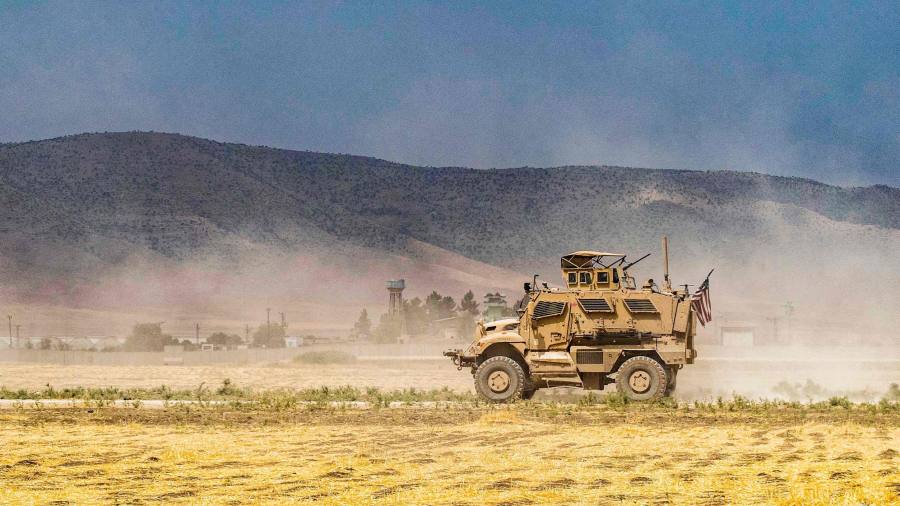US forces kill Iran-backed militia fighters in Syria
US forces killed three suspected fighters from Iran-backed militias in Syria late on Wednesday in response to an attack earlier that day on two military bases, which injured three US service members, US Central Command said. The tit-for-tat attack on the second consecutive day of violence between US and Iran-backed forces in Syria, came as the Islamic republic and the US attempted to resurrect the 2015 nuclear deal.US President Joe Biden on Tuesday ordered air strikes in Syria’s Deir Ezzor on a weapons depot and other installations used by groups affiliated with Iran’s Revolutionary Guards. “The United States does not seek conflict, but will continue to take necessary measures to protect and defend our people,” the US military said in a statement following Wednesday’s air strikes.The US had on Tuesday cautioned that “gaps” remain between Washington and Tehran over a draft agreement on the nuclear deal. Diplomats and analysts have said efforts to revive the accord have made progress after the EU brokered indirect talks between Washington and Tehran in Vienna this month, where they discussed what mediators described as a “final draft” of the agreement. Iran on Wednesday received the US response to its proposals and is due to answer soon.Neither Tehran nor the US has officially linked the attacks in Syria to the nuclear negotiations. However Mohammad Marandi, an adviser to Iran’s nuclear negotiating team, on Wednesday wrote on Twitter that “this particular US terror attack, was simply carried out to help sell the nuclear deal” in Washington. Colin Kahl, the US under-secretary of defence for policy, said on Wednesday: “The threats that they engage in against our people in the region or elsewhere, are not linked to wherever we end up on the nuclear deal.” He added: “I think the strike [on Deir Ezzor] . . . was a pretty clear communication to the Iranians that these things are all on different tracks.” He said the decision to launch Wednesday’s air strikes was in response to militia attacks earlier this month on a US outpost in a remote corner of Syria. The US maintains a small number of troops in Iraq and Syria, leading an international coalition that supports efforts to combat the remnants of the Islamic State group. Following the defeat of Islamic State, US forces have faced attacks by groups linked to Iran’s Revolutionary Guards. Washington has accused Iran-backed Shia militants of launching attacks — increasingly by armed drones — against US personnel and assets in Iraq, where US troops number roughly 2,500. About 2,000 troops remain in Syria. These spiked in 2020 after a US drone strike in Baghdad killed Qassem Soleimani, the head of Iran’s revolutionary guard’s overseas forces. The strike was ordered by former US president Donald Trump, who took a hard line against Iran throughout his presidency.Hardliners in Tehran and hawks in Washington are against the revival of the nuclear deal which Trump abandoned in 2018 and reimposed tough sanctions on Iran. The Kayhan newspaper, a mouthpiece for Iran’s hardliners, on Thursday said the nuclear agreement was a “disastrous agreement and pure loss” and criticised negotiators for dropping their demand to have the Revolutionary Guards removed from the US’s terrorist list. This “can help the US justify its latest attack under the pretext of attacking a terrorist group” in Syria, it added.Meanwhile Iranian media reported that a senior commander of the guards’ ground forces, Brig Gen Abolfazl Alijani, was “martyred” in Syria on Monday while on an “advisory mission”. No further details were given under what conditions he was killed. There was no official comment from Syria on the attacks.

US forces killed three suspected fighters from Iran-backed militias in Syria late on Wednesday in response to an attack earlier that day on two military bases, which injured three US service members, US Central Command said.
The tit-for-tat attack on the second consecutive day of violence between US and Iran-backed forces in Syria, came as the Islamic republic and the US attempted to resurrect the 2015 nuclear deal.
US President Joe Biden on Tuesday ordered air strikes in Syria’s Deir Ezzor on a weapons depot and other installations used by groups affiliated with Iran’s Revolutionary Guards.
“The United States does not seek conflict, but will continue to take necessary measures to protect and defend our people,” the US military said in a statement following Wednesday’s air strikes.
The US had on Tuesday cautioned that “gaps” remain between Washington and Tehran over a draft agreement on the nuclear deal.
Diplomats and analysts have said efforts to revive the accord have made progress after the EU brokered indirect talks between Washington and Tehran in Vienna this month, where they discussed what mediators described as a “final draft” of the agreement.
Iran on Wednesday received the US response to its proposals and is due to answer soon.
Neither Tehran nor the US has officially linked the attacks in Syria to the nuclear negotiations.
However Mohammad Marandi, an adviser to Iran’s nuclear negotiating team, on Wednesday wrote on Twitter that “this particular US terror attack, was simply carried out to help sell the nuclear deal” in Washington.
Colin Kahl, the US under-secretary of defence for policy, said on Wednesday: “The threats that they engage in against our people in the region or elsewhere, are not linked to wherever we end up on the nuclear deal.”
He added: “I think the strike [on Deir Ezzor]?.?.?.?was a pretty clear communication to the Iranians that these things are all on different tracks.” He said the decision to launch Wednesday’s air strikes was in response to militia attacks earlier this month on a US outpost in a remote corner of Syria.
The US maintains a small number of troops in Iraq and Syria, leading an international coalition that supports efforts to combat the remnants of the Islamic State group. Following the defeat of Islamic State, US forces have faced attacks by groups linked to Iran’s Revolutionary Guards.
Washington has accused Iran-backed Shia militants of launching attacks — increasingly by armed drones — against US personnel and assets in Iraq, where US troops number roughly 2,500. About 2,000 troops remain in Syria.
These spiked in 2020 after a US drone strike in Baghdad killed Qassem Soleimani, the head of Iran’s revolutionary guard’s overseas forces. The strike was ordered by former US president Donald Trump, who took a hard line against Iran throughout his presidency.
Hardliners in Tehran and hawks in Washington are against the revival of the nuclear deal which Trump abandoned in 2018 and reimposed tough sanctions on Iran.
The Kayhan newspaper, a mouthpiece for Iran’s hardliners, on Thursday said the nuclear agreement was a “disastrous agreement and pure loss” and criticised negotiators for dropping their demand to have the Revolutionary Guards removed from the US’s terrorist list. This “can help the US justify its latest attack under the pretext of attacking a terrorist group” in Syria, it added.
Meanwhile Iranian media reported that a senior commander of the guards’ ground forces, Brig Gen Abolfazl Alijani, was “martyred” in Syria on Monday while on an “advisory mission”. No further details were given under what conditions he was killed. There was no official comment from Syria on the attacks.





